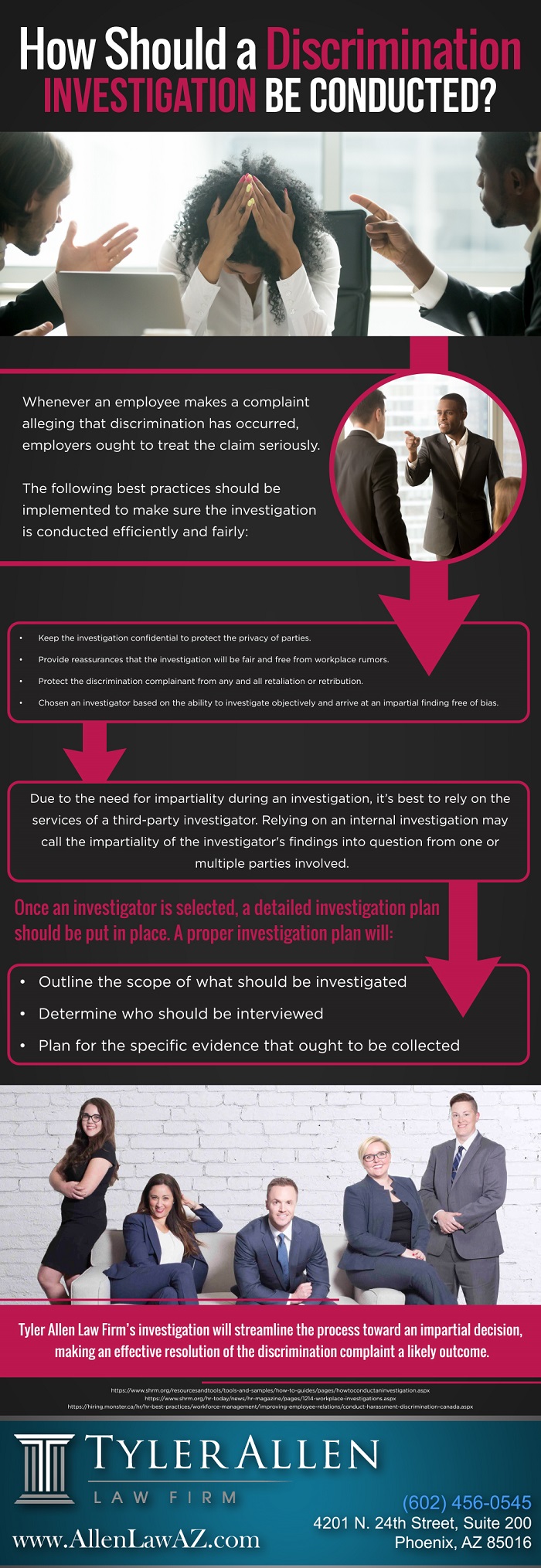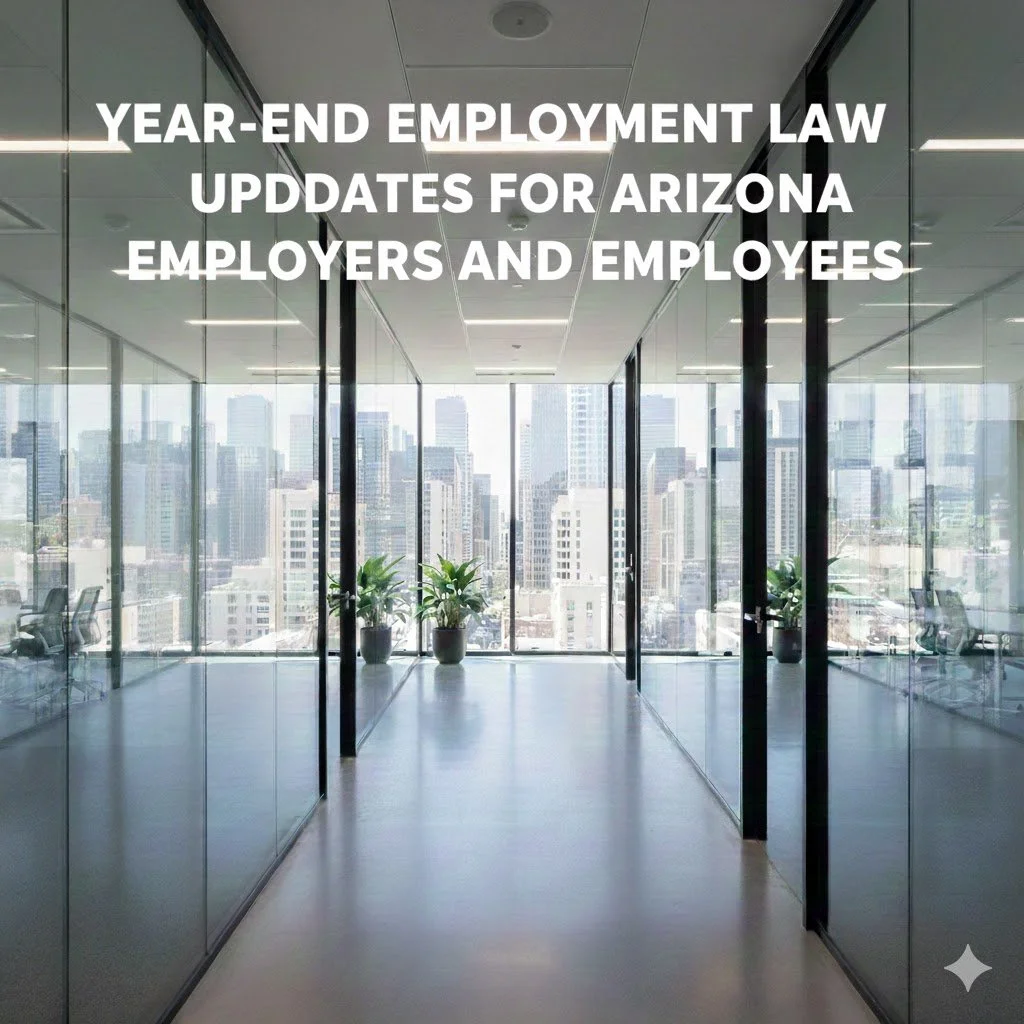Discrimination
Tyler Allen Law Firm represents people who have been treated differently at work because of their race, gender, age, religion, disability or national origin. We handle Equal Employment Opportunity Commission (EEOC) claims as well as violations of state and federal law. Discrimination is the unjust or prejudicial treatment of different categories of people. We have found that discrimination in the state of Arizona usually falls into one of the categories below

How Should a Discrimination Investigation Be Conducted
Age
Sexual orientation
Race
Gender/sex
Religion
National origin
Disability
It is illegal to discriminate and/or retaliate. If you feel you’ve been discriminated and/or retaliated against, you may have a right to compensation under the law. Contact an employment attorney at Tyler Allen Law firm to discuss the details of your case.
Blog Articles | Discrimination
Our expert criminal defense team at Tyler Allen Law Firm has over 30 years combined experience defending clients charged with sex crimes. We have compiled that vast array of knowledge into several informative blog articles to answer many frequently asked questions from those charged with these crimes.
Laws Against gender discrimination in the workplace
Steps to take if you’ve been discriminated against
LGBT WORKPLACE DISCRIMINATION
RETALIATION
MORE…
Contact us to discuss the details of your case by filling out the form on this page or calling us at (602) 456-0545
Additional Blog Articles | Tyler Allen Law Firm
The end of the year is when Arizona businesses finally slow down long enough to look closely at their workplace practices, and it’s also when employees start paying attention to how they were treated over the past twelve months. December has a way of exposing everything people ignored during the rest of the year — outdated policies, missing training, pay issues, and disputes that never quite got resolved. Whether you run a business or work for one, year-end changes in employment law matter because they determine what rights and obligations both sides walk into January with.
Every year, Arizona homeowners settle into the holiday season thinking about lights, inflatables, and a little extra cheer — and every year, someone is surprised by an HOA notice on their door. It almost always catches people off guard. The decorations feel harmless. Nothing about the holiday spirit seems like it should trigger a rule violation. But HOAs regulate exterior appearance more closely than most people realize, and the holidays are when those rules collide most often with everyday life.
The end of the year is when Arizona businesses finally slow down long enough to look closely at their workplace practices, and it’s also when employees start paying attention to how they were treated over the past twelve months. December has a way of exposing everything people ignored during the rest of the year — outdated policies, missing training, pay issues, and disputes that never quite got resolved. Whether you run a business or work for one, year-end changes in employment law matter because they determine what rights and obligations both sides walk into January with.
The holidays have a way of bringing families together and reminding us what truly matters. Between the travel, the meals, and the conversations that stretch late into the evening, it is also a time when many people think about the bigger picture. This is when questions about the future tend to surface. Who will make decisions if I cannot? Are my wishes written down somewhere? Have I made things as easy as possible for my family?
When someone decides to buy an existing company in Arizona, one of the first legal questions that comes up is how the deal will be structured. There are two main options: an asset purchase or a business purchase. They sound similar, but they work very differently and carry very different risks.
Choosing a trustee is one of the most important decisions you will make when creating a trust. A trustee is the person or institution you appoint to manage the assets in your trust and to carry out your instructions when you can no longer do so. The role is a serious one. The trustee has a legal duty to act in the best interest of your beneficiaries, to manage trust property responsibly, and to follow the terms you have written.
As the year winds down, Arizona business owners are busy wrapping up projects, closing out books, and trying to get a few quiet days before the holidays. It’s easy to focus on what’s in front of you, like client work, payroll, and planning for the next quarter. Before the calendar turns, it’s worth taking a moment to make sure your business is actually in good standing with the Arizona Corporation Commission.
As the year winds down, many Arizona employees are preparing for annual performance reviews. These meetings can shape your pay, promotions, and even job security. While your employer may frame the review as a casual check-in, it’s also a formal record that can affect your future. Here’s how to approach it with both professionalism and legal awareness.
Probate can feel like a maze. For families in Arizona, especially in Maricopa County, the process is often confusing, time-sensitive, and full of technical rules that aren’t obvious from the outside. Families stumble into the same traps again and again. These mistakes don’t just delay closing an estate — they can lead to personal liability, extra court hearings, or even lawsuits.
Beneficiary designations seem simple: you add a child or loved one to your bank account, retirement plan, or life insurance policy, and you assume your planning is done. While these forms do play an important role in estate planning, relying on them alone can create unintended consequences, disputes, and even court involvement.
For more information about your legal rights or to discuss the facts of your legal claim, contact Tyler Allen Law Firm, PLLC for a legal consultation.











